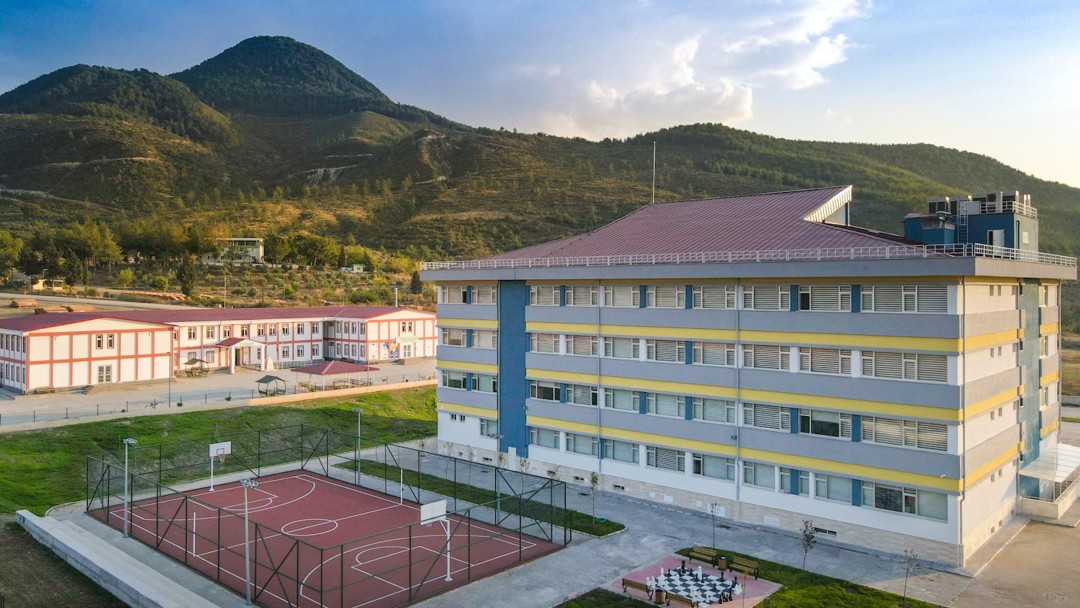
As of: 03/2024
As a result of the civil war in their home country, around 3.6 million Syrians have found safe refuge in Türkiye, including many children of compulsory school age. As a result, Türkiye currently hosts the largest number of refugees anywhere in the world. By building new schools, KfW Development Bank is helping Türkiye to ensure that all children may attend school. After southern and central Türkiye was struck by one of the most devastating earthquakes the country had ever experienced in February 2023, this support also includes the construction of more schools in the earthquake-affected area in order to mitigate the earthquake's impact on Türkiye's education system.
Türkiye currently hosts around 3.6 million registered Syrian refugees, including around one million school-aged children. When it comes to the provision of public services, the high number of Syrian refugees in the country presents a major challenge. Often, the existing infrastructure cannot cover the additional needs. The Turkish government has set itself the goal of providing all children in Türkiye with access to education in a high-quality and safe learning environment. This allows children to acquire the critical language skills they need, make friendships with their Turkish classmates, and ultimately complete their compulsory education. Despite the considerable efforts made by the Turkish government, the European Union, the German Federal Government and other donors, many refugee children still do not have access to education. One main reason is the lack of schools. Classes in existing schools are often oversubscribed and at many schools classes have to take place in two shifts. The EU has undertaken to help Türkiye provide necessary services for refugees.

The aim of the “Education for All in Times of Crisis” project is to help the Turkish government provide access to education for all children living in Türkiye.
To this end, the European Union has made funds available for the project. The total project volume is EUR 425 million; these funds are being used to finance the construction and furnishing of around 245 schools and kindergartens. The project is being implemented by UNICEF in close cooperation with the Turkish Ministry of Education. The devastating earthquake of 2023 has further increased the pressure on educational infrastructure both in the earthquake-affected area and in regions that have experienced a high influx of internal refugees. Therefore, preparations are currently underway to provide the project with additional EU funds, so that around 30 educational institutions can be supported. This will finance around 275 schools and kindergartens over three phases.
At the time of the earthquake, around 80 schools had been built in the earthquake-affected area using the project funds. All of these schools withstood the earthquake without incurring structural damage: in fact, some of these schools were temporarily used as emergency shelters or soup kitchens shortly after the earthquake, playing a role in acute crisis management in its aftermath.
Since the majority of Syrian refugees now live in host communities and are no longer in camps, almost all schools are built in established communities, with only a small proportion in refugee camps.
In addition to classrooms and specialist rooms, the schools also have libraries, cafeterias and social rooms. In addition, all buildings are disabled-friendly and should be easy to use for boys and girls alike. In addition to EU financing, further support for the reconstruction of educational institutions is currently being prepared, which the German Federal Government would like to provide to the Turkish Government via KfW. This will be used to build around 60 more schools in the earthquake area and in regions that have experienced a high influx of internal refugees.
Building around 275 schools can make a valuable contribution to bridging the capacity gap in Türkiye's school infrastructure. The project will create more than 100,000 additional school places, thereby improving access to education for Syrian children as well as the learning environment in general. The project is therefore making an important contribution to improving the lives of Syrian refugee children in Türkiye and opening up opportunities for their future. Since the earthquake, the project has also provided additional support to relieve the burden on the education system in the earthquake-affected area in Türkiye. The project is also strengthening the MoNE’s institutional capacity. The long-term and trusting cooperation with the MoNE is having a positive effect on the implementation of the project.
Cooperation with the MoNE:
The Turkish Ministry of National Education (MoNE) and KfW Development Bank are working in close cooperation with each other. In addition to the described “Education for All in Times of Crisis” project, the MoNE and KfW are implementing two other projects in the context of the Syrian refugee crisis: as part of the two EU-funded projects, KfW is supporting the MoNE in the provision of vocational training and education. It is also helping to increase the energy efficiency of schools through comprehensive rehabilitation measures and the generation of solar power.
The project contributes to the achievement of these following United Nations Sustainable Development Goals:
KfW Group
KfW Development Bank
Municipal infrastructure in southeast Europe and Türkiye
Share page
To share the content of this page with your network, click on one of the icons below.
Note on data protection: When you share content, your personal data is transferred to the selected network.
Data protection
Alternatively, you can also copy the short link: https://www.kfw-entwicklungsbank.de/s/enzBy7nh
Copy link Link copied